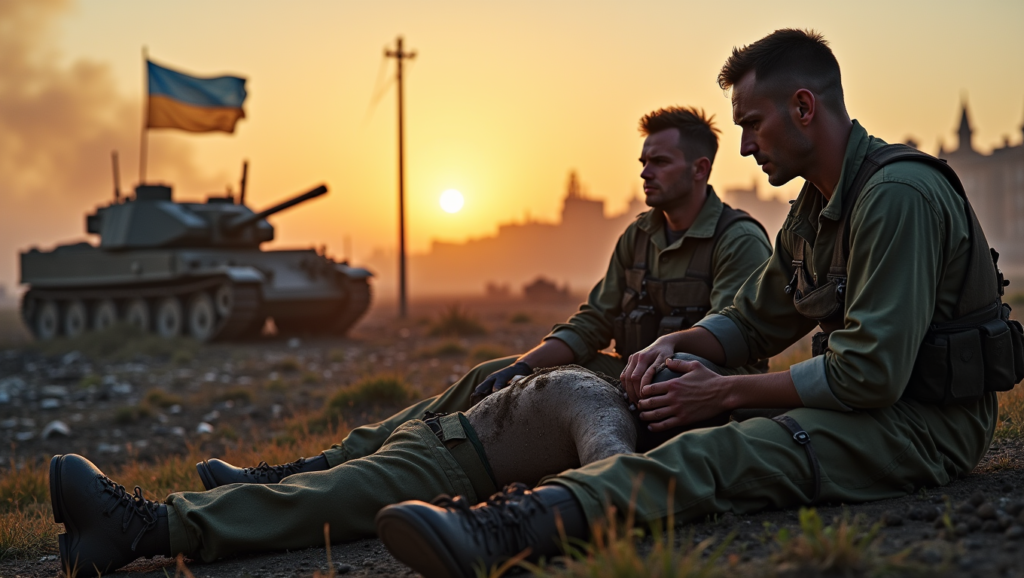Evaluating Putin’s Proposal for Ukraine Ceasefire Plan : A Genuine Peace Offering or Tactical Maneuver?
The ongoing conflict between Russia and Ukraine has seen a surprising development as Russian President Vladimir Putin outlines potential support for a Ukraine Ceasefire Plan lasting 30 days. However, this pledge appears conditional, with terms that heavily tilt in Russia’s favor. This declaration precedes a crucial meeting with former President Donald Trump’s personal envoy in Moscow, adding layers to the geopolitical chessboard. While Putin’s overtures seem to indicate a willingness to de-escalate, the strict Russia’s Ceasefire Conditions attached suggest a possibility of ulterior motives.
- Evaluating Putin's Proposal for Ukraine Ceasefire Plan : A Genuine Peace Offering or Tactical Maneuver?
- Dissecting Russia’s Ceasefire Conditions: Hidden Motives or Genuine Concerns?
- Territorial Maneuvering and Strategic Advances
- The Influence of the U.S. and Trump's Strategic Role
- Facing Reality: Continued Combat on the Ground
- Poland's Heightened Alert and Defensive Posture
- The Fragile Outlook for a Lasting Ceasefire
- Way forward
Dissecting Russia’s Ceasefire Conditions: Hidden Motives or Genuine Concerns?
Putin’s assertion that any truce should resolve “the root causes of the crisis” implies a demand for more than a simple pause in hostilities. The Kremlin’s stipulation against allowing Kyiv to rearm during a ceasefire effectively blocks Ukraine from bolstering its defenses. Ukrainian President Volodymyr Zelensky has quickly dismissed these stipulations, alleging that Putin is buying time under the guise of diplomacy while pandering to Donald Trump for political optics. Zelensky argues this is a delaying tactic, as Putin hesitates to reject the ceasefire openly but imposes impossible preconditions.
Territorial Maneuvering and Strategic Advances
Concurrently, Russian forces have gained ground, notably in the western Kursk region, where they have reclaimed Suja from Ukrainian control. This success on the battlefield seemingly fortifies Putin’s resolve against accepting ceasefire terms unfavorable to Russia. The Kremlin’s approach appears to be leveraging ongoing military achievements to amplify its bargaining power in forthcoming negotiations.
The Influence of the U.S. and Trump’s Strategic Role
In the United States, former President Trump is pressing for swift progress toward a ceasefire, highlighting that delays may influence U.S. support for the Russian stance. Trump has made it clear that a resolution is imperative but has also broached the controversial subject of Ukraine possibly conceding territory for peace. With his envoy Steve Witkoff in Moscow for talks, there is skepticism as Putin’s tentative engagement casts doubt on his true objectives.

Facing Reality: Continued Combat on the Ground
Despite high-level diplomatic engagements, the war’s intensity shows no signs of abating. Ukrainian forces at the frontline express skepticism about the ceasefire, interpreting Russia’s stipulations as strategic ploys to stall. As the human toll increases, overwhelmed Ukrainian medics struggle to cope with a surge in casualties, furthering distrust in Russia based on historic patterns of aggression.
Poland’s Heightened Alert and Defensive Posture
As a pivotal NATO member and Ukraine’s western ally, Poland has escalated its defense initiatives to unprecedented levels amidst the enduring conflict. The Polish administration has floated the controversial idea of hosting U.S. nuclear weapons as a proactive measure against Russian hostility. President Andrzej Duda has called for a reinforced NATO defensive stance, affirming Poland’s readiness to accommodate nuclear capabilities if deemed necessary.
The Fragile Outlook for a Lasting Ceasefire
As entrenched positions persist, the probability of a successful ceasefire remains suspect. Putin’s rigid conditions have cast doubt on his intentions, while Trump’s involvement underscores the volatile nature of negotiations. Should Russia continue to sidestep meaningful commitments, the country risks losing favor with the U.S., potentially invoking harsher diplomatic and military repercussions.
Way forward
Putin’s apparent openness to a Ukraine ceasefire plan appears more strategic than sincere. By proposing terms that disproportionately favor Russia while maintaining military activity, the Kremlin attempts to enhance its negotiating leverage. Meanwhile, Ukraine is unwavering in its defense of national sovereignty, as the international community watches to determine if Russia’s peace offerings are genuine or merely hollow gestures. As the world scrutinizes these developments, the question remains: Will diplomacy prevail, or is an escalation inevitable?
You May also Like: Government Shutdown Alert: Surprising New Developments in United States of America


